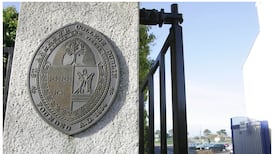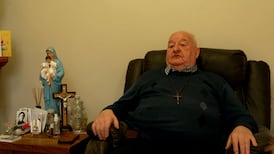Taoiseach Brian Cowen has appealed to EU leaders to provide him with a cast iron assurance today that Ireland's legal guarantees will in the future become a protocol.
The Taoiseach met with British Prime Minister Gordon Brown today to discuss resistance to Irish demands that guarantees have the status of a treaty protocol. It is understood the British position is that such a move would require ratification by all member states.
Bi-lateral meetings are continuing tonight.
Minister for Foreign Affairs Micheál Martin said this evening he hoped an agreement would be reached tomorrow morning.
In a letter to EU heads of state this morning Mr Cowen said he needed to be able to tell the Irish public that their legal guarantees would acquire full treaty status in the future.
The letter is introduced by Mr Cowen with the words "Iam writing to you in the strictest confidence" and he goes on to insists that agreement on a future protocol copperfastening the guarantees is "necessary if I am to call and win a second referendum."
It is, he says "a strong political imperative", warning that "the media debate in Ireland has already focussed on the form of the legal guarantees."
Spelling out the "requirement", Mr Cowen wrote that "what I ... require is a clear and unequivocal commitment that at a future point after the Lisbon Treaty enters into force , the legal guarantees contained in the decision will be attached to the EU treaties by way of a protocol."
Some diplomats are wary agreement to a protocol may be seen as a material change to the treaty requiring ratification by national parliaments.
The Government is seeking legal guarantees on neutrality, taxation and ethical issues such as abortion, family life and education. It wants the guarantees to be provided in the form of a protocol as soon as possible to ensure they enter into the text of the treaties.
Several EU states are opposing the Government’s request to get an assurance that its legal guarantees can be enshrined in the treaties via a legally binding protocol.
Britain, the Netherlands, Poland and Slovenia do not want to agree to provide a protocol because this would require every member state to ratify the legal instrument through their national parliaments - a process that may ignite a debate over the treaty in their home countries.
There are also growing concerns that providing an assurance of a protocol to Ireland, which could be ratified when Croatia joins the Union in 2011 or 2012, could provide the eurosceptic Czech president Vaclav Klaus with more arguments to stop him signing the treaty and completing ratification in the Czech Republic.
Mr Klaus warned yesterday that he believed the legal guarantees provided to Ireland justified starting a new ratification process in the Czech parliament, something which could delay the ratification of Lisbon.
EU diplomats fear any further delays to the ratification of Lisbon could allow Conservative party leader David Cameron to come to power in Britain. Mr Cameron has promised to hold a referendum on the treaty in Britain if he gets elected before the treaty enters into force. Most analysts believe this would fail killing the treaty once and for all.
The British Prime Minister Gordon Brown later refused to be drawn on whether he could support the Taoiseach's call. Speaking to journalists ahead of the meeting he said it "was important to do the right thing by Ireland and Europe" but that he did not want to do anything that would change the treaty in any way.
But Mr Cowen is pushing hard to get an assurance from EU leaders that Ireland can get its legal guarantees in the form of a protocol at the earliest opportunity
This would help the Government to counteract the arguments of the no campaign during a second Lisbon referendum. Prominent no campaigners are already arguing that the legal guarantees do not change anything in the Lisbon treaty and are therefore worthless. Mr Cowen believes a promise that they would enter the text of the treaties in the future would help the yes campaign.
Newly-elected MEP for Dublin Joe Higgins MEP described the EU summit as an “elaborate charade”.
Speaking at The Centre think tank, Mr Higgins warned that “not a comma” would be changed in the Lisbon treaty before a second referendum would be put to the Irish people.








